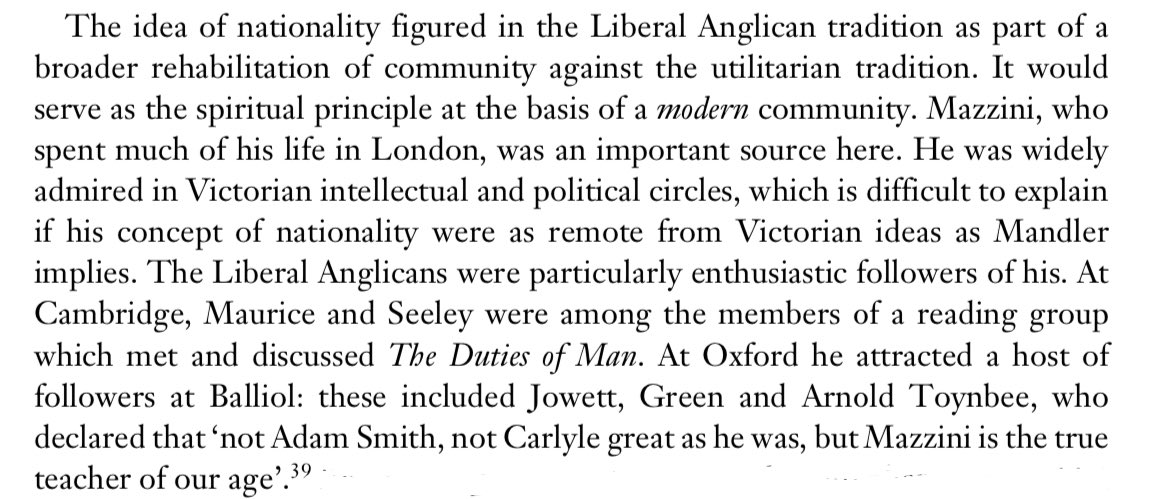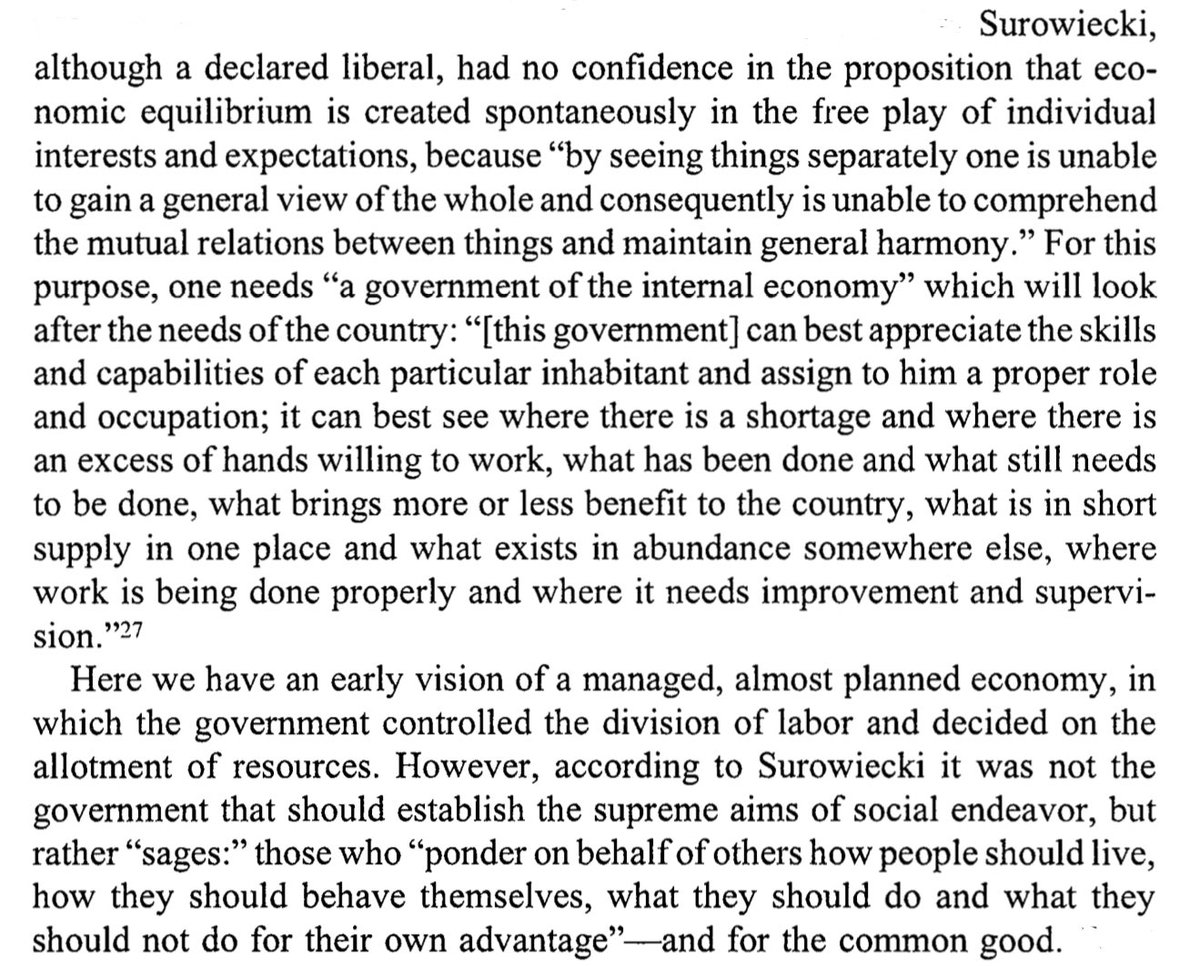I’ve become convinced that Naomi Klein and others who popularized “neoliberalism” should’ve imported the Italian term “liberism” or the German “Manchestertum” (which would probably be “Manchesterism” in English) to avoid this kind of silliness and confusion. https://twitter.com/mcrumps/status/1314252898654736384">https://twitter.com/mcrumps/s...
“liberism” is a truncated and ugly sounding version of “liberalism” which makes it apt for describing these economic doctrines. “Manchesterism” has the benefit of establishing historical continuity with a more specific ideology of British manufacturers and imperialists.
Here is Friedrich Hayek, the main ideologue of “neoliberalism” admitting:
“It was only liberalism in the English sense which was generally opposed to centralization, to nationalism, and to socialism, while the liberalism prevalent on the Continent favored all three.”
“It was only liberalism in the English sense which was generally opposed to centralization, to nationalism, and to socialism, while the liberalism prevalent on the Continent favored all three.”
To provide context for Hayek’s statement, it’s necessary for a brief history of the term “liberalism” in the political sense. And to gain an accurate picture, one must avoid tautologies and the urge to “write history backward” by imposing present assumptions on the past.
“Liberalism” as a self-conscious political creed does not emerge until the early decades of the 19th century and when it does, it was vague beyond referring “ideas stemming from the French Revolution” and - perhaps more importantly - ideas of nationality and national sovereignty.
At its inception, “liberalism” was associated with the Continent, and particularly with the nationalist struggles in Spain, Italy, and Greece.
One Greek historian could even write that the Greek War of Independence “offers the armed manifestation of the Liberal idea in Europe.”
One Greek historian could even write that the Greek War of Independence “offers the armed manifestation of the Liberal idea in Europe.”
In Britain, one of its earliest positive uses in the political sense was Leigh Hunt and Lord Byron’s periodical “The Liberal: Verse and Prose from the South”
“The South” obviously references the Southern European nations, and Byron went on to fight for Greek independence.
“The South” obviously references the Southern European nations, and Byron went on to fight for Greek independence.
Later in the 1830s and 1840s, the British agitators for the Reform Bill and repeal of the Corn Laws - and in this specific context there were many industrialists and merchants - appropriated the term “liberal” for themselves and this was the birth of “Manchester liberalism.”
“Manchesterism” with its emphasis on free trade, free markets, profit and capital accumulation, and loosening restrictions on business, does indeed have many parallels with what is now called “neoliberalism” in both its ideology and social base.
I should add that the British enthusiasm for free trade during this period was far from disinterested, and was correctly identified as an extension of Britain’s own national-imperial interests by the German national liberal Friedrich List, among others.
However, even in Victorian Britain, while “Manchesterism” was dominant, it was still not the only variant of liberalism present, nor were the connections with ideas of nationality entirely forgotten although Britain’s global empire complicated matters regarding national identity.
For example, British liberals and radicals were practically a cheerleading squad for the Italian Risorgimento, and Mazzini’s thought exerted such influence that Arnold Toynbee could declare “not Adam Smith, not Carlyle great as he was, but Mazzini is the true teacher of our age.”
The Gladstone era also brought national issues to the forefront, with the controversy surrounding Irish Home Rule, as well as his support for Bulgarian liberal nationalists, which broke with long-standing British realpolitik favoring the Ottomans.
I should add that the second half of the 19th century also saw increasing criticism of Manchesterite doctrines and the “socialization” of liberalism to the point where men like Stewart Headlam could state “I am a Christian and a Socialist, and I thank God I am a Liberal as well.”
In the case of Continental Liberalism, the matter is even more complicated and there’s no way I can give a very brief overview for each country like I did above for Britain, which I admit simplifies a lot. That’s why I’m writing a book to cover everything in more detail.
For now I will emphasize that, contrary to what so much Marxist and “neoliberal” (or “Manchesterite”) propaganda claims, political “liberalism” during the early 19th century was not attached to any specific economic doctrine in many continental countries.
For example, even among the *first generation* of self-identified liberals it is possible to find those who reject economic individualism and instead advocate a planned economy to serve the common good.
Likewise there was a strong Rousseauian or Romantic streak - ambivalent or hostile to industrial civilization and materialism -which persisted among many self-identified liberals, such as in this passage from the Portuguese liberal Almeida Garrett.
I know I’ve only furnished a handful of examples above, but for now take my word for it that I have many many more receipts and citations which I’m saving for the book and which will make my arguments unimpeachable. ;)
A few more things: in the context of 19th century continental Europe “liberalism” and “nationalism” were deeply linked, almost synonymous; there are very few exceptions, and you can safely ignore anyone who tries to tell you otherwise because they’re either ignorant or dishonest.
In addition, this link between liberalism and nationalism was once common knowledge.
Here’s a quote from Big H himself, Adolf Hitler: “The Nation is the political expedient of democracy and Liberalism. We have to get rid of this false conception [and replace it] with Race.”
Here’s a quote from Big H himself, Adolf Hitler: “The Nation is the political expedient of democracy and Liberalism. We have to get rid of this false conception [and replace it] with Race.”
With regard to early political economy and the capitalist mode of production, for that you have to go back much further in time and look at the School of Salamanca and their break with Just Price theory, but that’s a complicated topic and one I’ll have to discuss another time.

 Read on Twitter
Read on Twitter



![In addition, this link between liberalism and nationalism was once common knowledge. Here’s a quote from Big H himself, Adolf Hitler: “The Nation is the political expedient of democracy and Liberalism. We have to get rid of this false conception [and replace it] with Race.” In addition, this link between liberalism and nationalism was once common knowledge. Here’s a quote from Big H himself, Adolf Hitler: “The Nation is the political expedient of democracy and Liberalism. We have to get rid of this false conception [and replace it] with Race.”](https://pbs.twimg.com/media/EkDfO1sWsAAm4W2.jpg)



